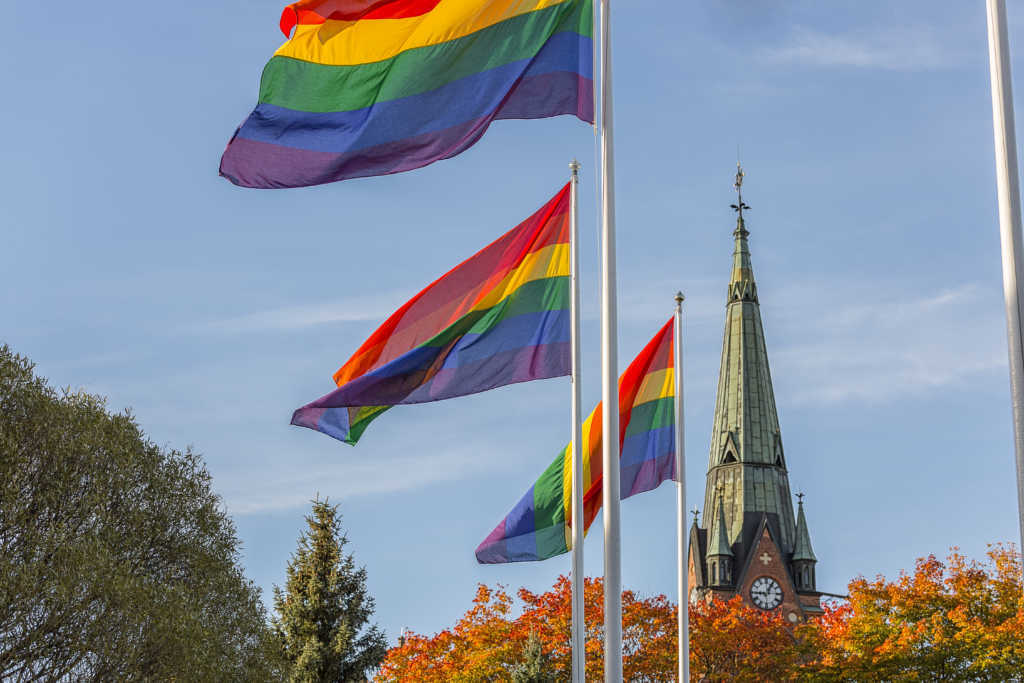The Church of England has issued new pastoral advice on how to affirm the sexuality of transgender people “in the context of Baptismal faith.” The newly published guidance recommends the adaptation of baptism services to accommodate and celebrate those who identity as transgender.
San Francisco Unveils World’s First Transgender Cultural District
“The Church of England welcomes and encourages the unconditional affirmation of trans people, equally with all people, within the body of Christ, and rejoices in the diversity of that body into which all Christians have been baptized by one Spirit,” a segment of the guidance reads.
The modified service, laid out in meticulous detail within the published guidelines, would allow the individual to be addressed by his or her preferred name, rather than their birth name.
“Where such a person has already been baptized,” the guidance continued, “the House of Bishops commends the rite of Affirmation of Baptismal Faith as the central feature of any service to recognize liturgically a person’s gender transition.”
Retired healthcare chaplain and trans clergy member, Reverend Dr. Tina Beardsley, was delighted by the latest progression.
“For me the most important thing was actually having this certificate to say that I had renewed my baptism vows and it had my chosen name on it,” she told BBC News.
The Church of England has stopped short of introducing a new form of liturgy which affirms the sexuality of transgender individuals, but it certainly goes as far as possible to welcome them into the fellowship of believers.
“Trans people are as diverse as any other social group and ministers should avoid stereotyping,” the guidance warns. “It is appropriate, however, to identify the preference of a transgender person in respect of their name and gendered (or other) pronouns. It should be noted that the term ‘transgender’ is typically preferred to transgendered. For example, the terms ‘trans man’ (referring to someone who has undergone female-to-male transition) and ‘trans woman’ (male-to-female) are sometimes preferred by the individual concerned.”
Céline Dion Stands by Controversial Gender-Neutral Kids’ Clothing Line
It also stresses that any affirming baptismal service of this nature should “have a celebratory character” and that the presiding minister should ensure they are “sensitive to their pastoral needs.”
“We are absolutely clear that everyone is made in the image of God and that all should find a welcome in their parish church,” said the Bishop of Blackburn, Julian Henderson. “This new guidance provides an opportunity, rooted in scripture, to enable trans people who have come to Christ as the way, the truth and the life, to mark their transition in the presence of their Church family which is the body of Christ.”
Critics insist that the latest pastoral guidance violates the biblical declaration that God made us male and female. Christian Concern’s Andrea Williams believes the Church of England is on a “devastating trajectory towards an outright denial of God and his word,” according to Premier UK.
“There is no need for Christians to sacrifice truth in a misguided attempt to be loving,” Williams noted. “It is not loving to mislead people — and wider society — into the falsehoods and myths of transgender ideology.””
What is the background?
The Church of England’s governing body, called the General Synod, has come under increased pressure to double down on efforts to make transgender people feel welcome in its churches. Last year, the Synod voted to explore the idea of holding special services that cater exclusively for the transgender community.
At that time, Archbishop of Canterbury and head of the Anglican communion, Justin Welby, noted that the Church would spend three years poring over a document outlining a brand new stance on sexuality.
What is the position of the Episcopal Church?
The Episcopal Church in the United States, a member of the Anglican Communion, has also made significant adjustments to its theological declarations with regards to the transgender community. In May of this year, the Church decided to scrap the terms “husband” and “wife” from its marital liturgy in its latest move to find favor with the LGBT community. Phrases related to “procreation” were also deleted, as they were thought to be offensive to those who do not identify as heterosexual.
Gay and lesbian Episcopalians have been increasingly vocal in their complaints that the language of the current liturgy is both offensive and exclusionary. Being a member of the worldwide Anglican Communion, the US Episcopal Church comes under the loose governance of the Church of England, and consequently the Archbishop of Canterbury.
The Church of England’s Secretary General William Nye has been extremely critical of the change to such a sacred text and has even threatened to cut ties with the American church if it decides to introduce the new service as standard. The drastic change would see the new service replace the phrase “the union of husband and wife” with “the union of two people.”
Couples will still be able to opt for the most traditional “husband” and “wife” when making their vows, but this will not be included in the standardized version. In his letter, Nye said that using the new language as standard would lead to a growing “pressure to dissociate” the Church of England from the U.S. Episcopal church, warning that conservative members would see any such change to marriage liturgy as “completely unacceptable.” Nye warned the Episcopal Church to avoid “irrevocably redefining marriage” through railroading their new liturgical language into Church proceedings.
The growing influence of transgenderism continues to affect the Church in a profound way. The desire to see transgender individuals recognized for their chosen identity has spawned several different pressure groups built up from within the Episcopal Church. One of these lobby groups, “Trans Episcopal,” seeks to foster “the full embrace of trans and nonbinary people, and our loved ones within the Episcopal Church,” and notes that it has seen “tremendous changes in the Episcopal Church in its awareness of the trans community within it” over the past few years.



